- Home
- Jerry B. Jenkins
Shadowed Page 2
Shadowed Read online
Page 2
* * *
Paul answered his call. It was [Italian underground leader] Enzo Fabrizio from Rome. “It’s happened, Paul. Are you watching the news?”
Ranold, pale, answered his private phone. “Oh, Bia! No!” he said. “My son too!” He slammed his fist on the kitchen counter. “I’ve got to get to Berlitz and help Aryana,” he said. “Paul, will you come?”
“Let him stay with Mom, Dad,” Jae said.
“Ranold,” Paul said, “it’s happened.”
“What’s happened?”
“The curse. The plague. The warning from the underground.”
“What? What!” Ranold looked wildly at everyone in the kitchen, his eyes finally landing on Connor. “But, but your son, your firstborn son is fine!”
The kids burst into tears. Ranold stormed out.
Jae helped her mother into a chair and fanned her. “You kids help me with Grandma. Now! Get me a glass of water. Paul, you’d better check the news.”
Paul made his way back into the den, where news bulletins of millions of deaths poured in from around the globe. And knowing his and Jae’s and the kids’ lives would never be the same, Paul heard the report from Bern, where it was announced that International Government Chancellor Baldwin Dengler was mourning the loss of his own eldest son.
1
PAUL STOOD BEFORE THE TELEVISION, fighting to keep from hyperventilating. He had been in life-and-death situations, had faced his share of kill-or-be-killed scenarios. He had long trusted his instincts and had proven that his prodigious intellect could sort through myriad possibilities even under pressure and keep him calm enough to make wise decisions.
But never had he been awash with so many consequences, all bad. Could anyone anywhere doubt that this global catastrophe—the sudden, inexplicable death of every firstborn male child, regardless of age, in every family that refused to acknowledge God—was anything other than what had been warned?
On one hand, Paul envisioned a mass turning to faith on the parts of terrified people around the world. On the other, the carnage was unimaginable. What percentage of the global population lay dead where they had stood, sat, lain, run, walked? And what would this mean to the economy, to service industries, to law enforcement, to the military? For that matter, what would it mean to normal existence? How would people simply get around?
There had to be bodies everywhere, and if it was true they were supernaturally slain by God, not one would likely exhibit any examinable pathology. There would be no bleeding, no trauma, no evidence of why hundreds of millions of men and boys and even infants merely ceased to live. Perhaps rather than a massive turning to God, the opposite would be true.
Jae herself had said that a global curse like this would have to persuade her of the intervention of God into the affairs of man, but that she would also have a hard time understanding or liking Him much. And this from a woman clearly on the cusp of belief. Surely millions would use the chaos and mourning to justify their hatred toward such a seemingly vengeful and spiteful God.
It would be quite a step, Paul told himself, from atheism to begrudging acceptance that there was a supreme being. But most, he was sure, would have preferred to have been convinced there was a God who was about only love and peace and harmony, not also about justice and righteousness and judgment.
As he flipped through the channels, Paul was reminded of the amateurish TV news work he had perused in the archives during his doctoral studies years before. History had provided occasions when events overwhelmed even the most professional newsperson. The assassination of U.S. president John F. Kennedy, nearly eighty-five years prior, had caused reporters to pale and a celebrated anchor to succumb to emotion.
A U.S. space disaster in the previous century had left news journalists scrambling, airing rumors and unconfirmed reports, reading from newswires rather than teleprompters and then having to correct misinformation, often in obvious anger.
Terrorist attacks from before Paul was born showed broadcast journalists clumsily trying to sort fact from rumor and appearing to try to maintain an air of professionalism while plainly ashen with fear. Historical broadcasts during World War III showed the same, as the death tolls from the tsunami and other nuclear-caused massacres overwhelmed on-air personalities.
It was the same now. Just minutes old, the horrific news from around the world unmistakably rocked broadcasters appearing desperate to remain objective. But as the enormity of the situation hit them—several newsrooms with talent and behind-the-camera staff lying dead—those remaining seemed to realize the ramifications.
If this was what the underground zealots had predicted, had prayed for, and now claimed, everyone would be affected in some way. Rare was the person who didn’t have a relative— father, brother, grandfather, uncle, son, cousin—who was a firstborn male. And what about friends and acquaintances? Paul saw the truth begin to register on the faces of the reporters and anchorpeople. They had to be frantic to get off the air and onto the phone to confirm their worst fears.
And with every second, the death toll rose. Of course, it was not limited to firstborn males. The slaughter extended to innocents, to passengers in planes piloted by firstborns, or driven in cars, trucks, buses. Pedestrians had been wiped out by driverless cars; surgeons had collapsed onto patients; fathers had dropped infants; electricians had fallen into live wires; firefighters had dropped on the job, their fire hoses shooting away from blazes.
The extent of the cataclysm would not be known for days, perhaps weeks. Paul couldn’t imagine the demand for funeral services. Surely there could be no keeping up with the corpses already piling up around the world. Mass graves would become necessary, colossal funeral pyres, refrigeration for those who could afford to wait for burial space.
Atop all this, of course, would be the devastating toll of human grief. How does a family, a clan, a people, a nation, a world mourn a loss so all-encompassing? Nothing would ever be the same, Paul knew. Not for the USSA. Not for the world. And certainly not for him.
It was a fearful thing to fall into the hands of an angry God.
2
IN THE KITCHEN, Jae was unnerved at the silence of the children. Normally rambunctious and talkative, they were, naturally, stunned. Their grandmother had fainted and was just now rousing. Their grandfather had railed at their dad and seemed angry that Connor, Paul and Jae’s firstborn son, was alive.
Jae couldn’t tell how much either Brie or Connor had absorbed. She prayed that at eight and six they were too young to understand. But still they moved stiffly, faces pale, merely following their mother’s orders. “Everything’s going to be all right, kids,” she said. “Just keep helping Mommy.”
“Where’d Grandpa go?” Brie said.
“To pick up Uncle Berlitz and Aunt Aryana.”
“Why?”
“They’re coming for dinner, remember?”
“What’s wrong with their car?”
“We’ll have to ask when they get here.”
Jae didn’t know why she was lying, delaying the inevitable. It was unlikely they’d see even Aryana this evening, and no way would they see their dead uncle. In fact, it was becoming plain to Jae, they had better not be here when her father returned.
“Is it true?” Margaret Decenti managed as her eyes fluttered and she sat up. “Is Berlitz dead?”
Jae saw the children turn. “Daddy’s gone to help,” she said. “We’ll know more when—”
“Dead?” Connor said.
“Mommy!” Brie said, wailing.
“You two do me a favor,” she said. “Run upstairs and start packing your stuff.”
“Why? Where are we going?”
“We have to hurry,” Jae said. “Can you help Mommy, and I’ll explain later?”
“I want to know now,” Connor said.
“No!” Margaret said, trying to stand. “Your mother’s right! You must leave and soon. You must not be here when your grandfather returns!”
Now both children cried,
and Jae called for Paul.
* * *
Paul hurried into the kitchen. His mother-in-law looked terrible, Jae shaken, and the kids out of control.
Mrs. Decenti, usually docile and tentative, reached for Paul and pulled him close while barking at Jae. “Take the kids,” she said. “I’m fine. Now, Paul, listen. My husband may be many unsavory things, but he most certainly is not stupid. He figured this out before he left the house. You heard him. I was barely conscious, but I heard him. We’d been talking about this since the warning came from the underground. He pooh-poohed it, but he always added that in a way he wished it would happen. He said it would make it easy to know who the enemy was. They would be the dogs whose firstborn male children remained.”
Paul was at a loss. She was right, of course. But where would they go? How long would it take Ranold, even in his grief, to sic NPO forces on his own family? Paul and Jae would be easily recognizable sitting ducks, especially with two small children. There was a chance that the sheer pandemonium might give them time. Surely the NPO had more important things to do than to worry about a turncoat agent, even if he was Ranold B. Decenti’s son-in-law.
But who could measure the depth of Ranold’s rage, his determination, his vengeance? Might he harm his own daughter? his own grandchildren? Ranold would feel obliged to protect his grandchildren from their own father, a traitor.
Jae was dragging the children toward the stairs, though they fought to stay in the kitchen.
“Lots to do, Brie, Connor,” Paul called after them. “Show me how responsible you can be.” What a nightmare for them. No kid of any age deserved this kind of calamity. Yelling, fainting, talk of death, parents on the edge of panic.
Paul pulled the curtain aside and peered out the kitchen window into the blackness of the driveway until his eyes grew accustomed to the faint light from a bulb at the peak of the garage. The driveway was empty. In his haste, Ranold had raced off in Paul’s rental. The only car left was Ranold’s NPO-issue sedan in the garage. With a radio connected to NPO headquarters, perhaps Paul could stay ahead of his pursuers. Once he knew their plans, he could initiate his own, and if he heard they knew what car he had taken, that would signal the time to switch, hide, lie low.
But where would they go? They were a long way from the Detroit salt mines or Chicago. And dare they drag frightened children along on an escapade like that?
It was as if Paul’s mother-in-law could read his mind. “Let me keep the children,” she said.
He shook his head. “We’ve been away from them too long as it is. Besides, Jae would never allow it. And who knows what Ranold might do?”
“He’d have to kill me before he could lay a finger on either of them.”
“I know, Margaret, but—” He helped her stand.
“You have to do what you have to do, Paul. But you had better do it soon.”
The phone rang and Margaret picked up. “What’s happening, dear?” she said, rolling her eyes at Paul. “Aryana’s okay, under the circumstances? Me? Well, what do you expect? I’m numb. . . . He’s right here. Sure.”
She handed the phone to Paul and leaned close so she could hear too. Ranold didn’t even take the time to greet him. “Listen, son, I need help. I need counsel. You don’t have to fear me, because it’s all clear to me now. You’re right. I’ve been wrong, and I need to know what to do about it. I might even need you to pray with me; could you do that?”
His answer would confirm for the first time for Ranold where Paul stood. What point was there in hedging now? Connor’s well-being was all the evidence Ranold needed. “Well, sure,” Paul said, “I—”
“This is so hard, Paul, so difficult on your mother-in-law and me. Promise you’ll be there for me when I get home. Aryana is going to stay with Berlitz until we can determine some disposition of the body. Will you be there, Paul?”
“Hurry home, Dad.”
As soon as he had hung up, Margaret said, “You didn’t buy a word of that, I hope.”
“Not a word.”
“You’ve got to get out of here—and fast. How can I help?”
* * *
Upstairs Jae was packing like a madwoman. Would she be able to talk her mother into coming with them? Not in front of the children. She had promised she would explain everything if they would just help her get packed. They were sniffling, clearly terrified. She wished she could sit and cry.
When she heard footsteps on the stairs, she panicked. Had her father returned already? Her mother and Paul entered, and Paul immediately took charge of the kids while studying his personal digital assistant. As soon as the kids were preoccupied and out of earshot, Jae pleaded with her mother to pack a bag and join them.
Margaret Decenti began shaking her head from the first word. “I can take care of myself,” she said. “Your father will demand to know where you’ve gone, and I’ll say I thought it was his idea and that he knew. He’ll explode, but I’ve been through that before. He’ll yell and scream, but he won’t hurt me. Now hurry.”
3
IN ALL THE CRISES Paul had found himself in over the years, he had never really worried about the kids. Oh, he wondered if Jae would be all right taking care of them if anything happened to him, and while he hated to dwell on it, he knew a young, attractive woman like her wouldn’t stay single long. And besides, the kids needed a father figure.
But this was different. They were with him now, under his charge—and he had become an international fugitive, punishable by death. Besides the crushing burden of responsibility for their safety, he had never had to act decisively in a professional sense in their presence. How would he be able to concentrate? Would it be fair to Jae to lay on her the responsibility of keeping them quiet so he could think?
He lugged down a couple of the suitcases, found Ranold’s car keys on a hook in the kitchen, and made his way to the garage. When he returned, Jae and the kids had brought down the rest of the luggage, and she was assuring them she would keep her promise. They would know soon enough what was going on.
Paul knew he was exacerbating the tension by grabbing stuff from the kids and slinging it into the trunk, but he didn’t see an alternative. Time was not their friend.
As Jae herded the kids into the backseat and buckled them in, Paul whispered, “Your mother will be okay?”
“Do me a favor,” she said. “Help me decide. Say good-bye to her and tell me what you think. Everything in me says to not leave her here alone.”
“Jae, we’ve got to go.”
“Please, Paul. It’ll take less than a minute.”
He rushed back in and found his mother-in-law sitting and rocking before the television. She was moaning, “Berlitz, Berlitz.”
“We’re going, Margaret,” he said. “Are you sure you don’t want to come along?”
She shook her head, but she looked wasted. How could she not? Her grown son, her only son, was one of the dead. Millions of mothers were grieving, but that made her pain no less personal. Would she be able to stand up to Ranold in her condition? He would erupt when he found Paul and Jae and the kids gone. In no time he would make them targets of a massive manhunt, numbers one through four on his Most Wanted list.
“Paul, sit with me a moment, would you?”
“Margaret, I’m sorry, but we have to—”
“Just a moment.”
He checked his watch and peeked at his PDA again.
“I saw the letter from your father, you know,” she said. “The one he sent you to open on your twelfth birthday. Jae showed it to Ranold and he showed it to me. He thought it would infuriate me, make everything clear to me. I haven’t been able to get it out of my mind. It had the most profound effect on me. Your father was devout. He truly believed. And oh, how he loved you.”
“He did.”
“I’m not stupid either, Paul. I live in the shadow of a powerful man, and I’ve learned to keep my place. But that doesn’t mean I don’t know what’s going on. That Connor is alive proves you are a beli
ever.”
“Actually it doesn’t, Mom, in spite of what Ranold thinks. By ‘firstborn male,’ we think the Scripture refers to a child that is both male and born first, not simply the first male born in a family.”
“But you, Paul, you qualify.”
“I do.”
“And so you are a believer.”
“I am.” How freeing it felt to say so.
“And Jae?”
Paul cocked his head. “She’s close, if not there yet.”
“It won’t be long. She’s a lot like me, and I don’t need any more convincing. Person would have to be a fool not to see what’s going on here. I don’t know what it’s all leading to, but I want to be on the right side of it when it happens. I’ve already lost my son. I don’t want to lose my soul.”
Paul was stuck. He couldn’t walk out on his mother-in-law at a time like this. And yet he couldn’t stay and suffer the consequences of the rage of his father-in-law either.
“You don’t have to lose your soul, Margaret.”
“I know. I’ll figure it out. You go.”
He shook his head. “I don’t feel right leaving you—”
“Nonsense. I’m a grown woman who has lived decades with a difficult man. For once we’ll have something to share. He loved Berlitz too, you know, in his own clumsy way.”
“You think you can comfort each other?”
“He won’t likely think of my grief,” she said. “Keeping him from exacting revenge will keep me busy.”
Paul couldn’t remember feeling so torn. He had to act fast and decisively, but he was being pulled in too many directions. Part of him wanted to just stay and have it out with Ranold, to challenge him, dare him to take his grandchildren’s father out of the picture.
He heard the door between the kitchen and the garage and prayed it wasn’t Ranold. He wasn’t ready.
Jae appeared. “Listen,” she said, “both of you. Maybe this isn’t my decision. Maybe I’m out of place here. But I have made up my mind, and I cannot be dissuaded. I’m staying with Mom until Daddy returns.”

 The Betrayal
The Betrayal The Valley of Dry Bones
The Valley of Dry Bones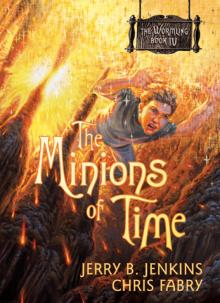 The Minions of Time
The Minions of Time Wild Rescue
Wild Rescue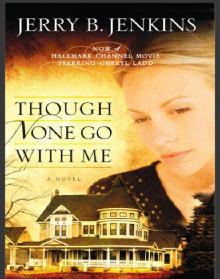 Though None Go with Me
Though None Go with Me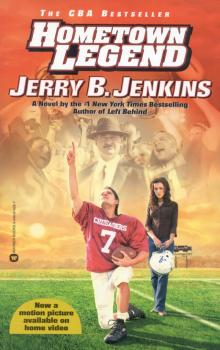 Hometown Legend
Hometown Legend The Breakthrough
The Breakthrough The Youngest Hero
The Youngest Hero Nicolae High
Nicolae High Through the Flames
Through the Flames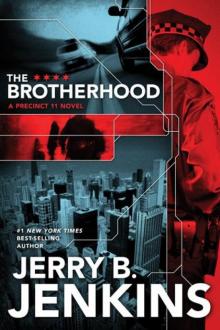 The Brotherhood
The Brotherhood Grave Shadows
Grave Shadows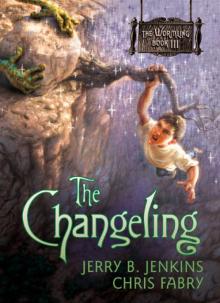 The Changeling
The Changeling Shadowed
Shadowed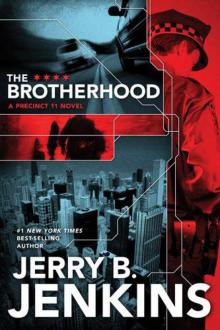 Precinct 11 - 01 - The Brotherhood
Precinct 11 - 01 - The Brotherhood Second Chance
Second Chance Silenced
Silenced The Vanishings
The Vanishings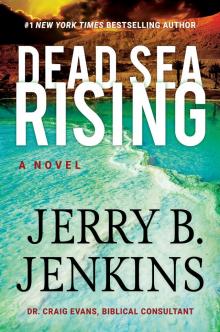 Dead Sea Rising
Dead Sea Rising Soon
Soon The Author's Blood
The Author's Blood The Sword of the Wormling
The Sword of the Wormling Left Behind - The Kids 02 - Second Chance
Left Behind - The Kids 02 - Second Chance Haunted Waters
Haunted Waters The Underground
The Underground Mark's Story
Mark's Story Shaken
Shaken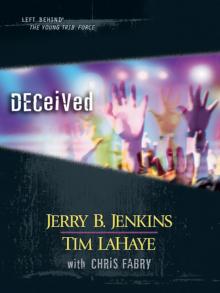 Deceived
Deceived Frantic
Frantic Riven
Riven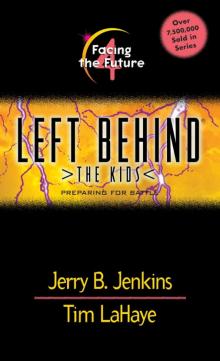 Facing the Future
Facing the Future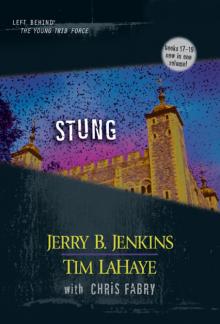 Stung
Stung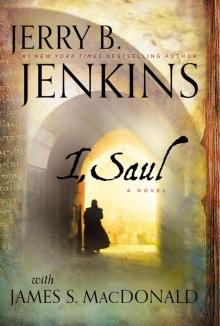 I, Saul
I, Saul Hunted
Hunted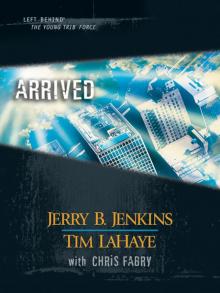 Arrived
Arrived John's Story
John's Story Stolen Secrets
Stolen Secrets